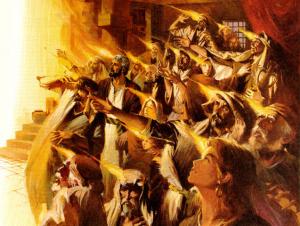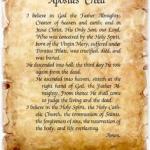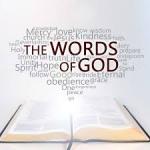I have the privilege of giving the Pentecost Sunday sermon at the Episcopal church we attend this morning. Trinity is a small and vibrant congregation; we are currently seeking a new priest after our former priest of several year moved to a different parish three or four months ago. Here’s what I’ll be saying in the sermon.
The Day of Pentecost—next to Christmas and Easter, undoubtedly the biggest single day on the Christian liturgical calendar. I was taught as a child that Pentecost is “the birthday of the church,” although I had no idea what that meant. One thing is clear, though—Pentecost marks the coming out party of the Holy Spirit.
In John 3, perhaps the best-known chapter in the New Testament, Jesus is visited by Nicodemus, a Pharisee who is fascinated by what Jesus has been saying and doing but worried enough about it that he visits Jesus at night. When Nicodemus is confused by what Jesus means when he says that “unless a person is born of water and of the Spirit they cannot enter the Kingdom of God,” Jesus explains with one of his famous metaphors, comparing the Spirit to the wind, which “blows where it wishes. You hear the sound of it, but can’t tell where it comes from or where it is going.”
So, it is no surprise that on the day of Pentecost, “there was a sound of a mighty rushing wind.” Sometimes the Holy Spirit is subtle and incognito, but this time she put on a show. The Christian narrative is full of such events—the birth of Jesus, the Resurrection . . . instant gratification events at the heart of belief that are so filling and satisfying that one could imagine that this is the exclusive food that fuels the life of faith. Each of us has had such moments—my family calls them Big Bird moments– times when the veil between the mundane human and glorious divine is pierced, even for a moment, in some unforgettable way.
But are such “mountain top” experiences sufficient to fuel the life of faith in the mundane energy of day-to-day living? Pentecost marks the beginning of “ordinary time,” the longest and, arguably, most uneventful stretch of the liturgical calendar. Think of those who experienced the first Pentecost. Will that experience be enough to sustain those who experienced it when, weeks or months later, they are alone in chains awaiting torture or execution? Will your most spectacular Big Bird moment from the past be enough to get you through the stress of parenting, the tragedy of loss, a divorce, a lost job, an illness, the daily grind, or more than two years of Covid-19 disruption? Are such moments enough to sustain a community of faith when a beloved priest unexpectedly leaves, and we have no certainty about what’s coming next? In the rear-view mirror, the intensity and certainty of Big Bird moments fade over time. Doubt becomes a constant companion of faith.
In the first scene of John Patrick Shanley’s Pulitzer Prize winning play Doubt, Father Brendan Flynn begins his Sunday homily by asking “What do you do when you’re not sure?” He then tells the story of the sole survivor of a shipwreck, a sailor who finds himself floating with a few salvaged provisions in the middle of the ocean on a raft he’s lashed together from floating spars. Using his nautical training, he looks toward the night sky and reads the stars, sets a course for home, and falls asleep. But clouds roll in and block the stars for the next twenty nights. As his provisions dwindle, as thirst and starvation threaten, he begins to have doubts. Is he still on course? Did he set his bearings correctly in the first place? Was his reading of the stars accurate enough to get him home? Or is he doomed to a slow and lonely death in the middle of an unfriendly sea?
I once asked the Living Stones discussion group at the beginning of one of our monthly seminars the following question: “How do we know for sure that we are right? How do we know that what we say we believe every week in the Nicene Creed is true?” The immediate and unanimous response from several of the Stoners was “We don’t.” This may be a very Episcopalian thing to say, but many Christians would consider it to be dangerously wrong—I’ve been told on social media and by commenters on my blog that I’m a heretic and going to hell for saying regularly that doubt and uncertainty are regular companions of faith. But we know better.
One of the final books we considered in my recently concluded “Faith and Doubt” colloquium was Tomáš Halík’s Patience with God. It was my first time through this evocative and dense book that was suggested by my teaching partner. For today, it’s enough to simply appreciate the book’s title and the notion that God is something or someone that we need to have patience with. I think most people of faith, at least occasionally, wish that the God they believe in would demonstrably do something—preferably in answer to a specific prayer. Or maybe something spectacular like the day of Pentecost. But “Let this play out” and “Don’t rush it” are the sorts of phrases that resonate more strongly with my own faith journey—perhaps with yours as well.
In her excellent 2013 book Still, Lauren Winner tells the story of a friend, a pastor’s daughter, who at twelve years of age on the eve of her confirmation service told her father that she was having second thoughts about whether she should be confirmed. She didn’t know whether she really believed all of the things she was supposed to believe, and she was particularly concerned about professing in front of the church that she was ready to believe these things forever. Her wise father responded that “What you promise when you are confirmed is not that you will believe this forever. What you promise when you are confirmed is that this is the story you will wrestle with forever.”
As a preacher’s kid myself, I greatly appreciate this pastor’s loving response to his daughter. The larger religious world in which I grew up was all about certainty, inerrancy, and doctrinal purity. My father was a minister in that world, but over the years I observed him wrestle with the story regularly, evolving from the national vice president of the Independent Fundamental Churches of America to a tongues-speaking charismatic whose primary focus was facilitating the health of those who had been damaged by bad religion. Although we had few explicit conversations about his evolution, I learned by observation that “adventuring with God,” as he would have described it, was exactly that—an adventure. Furthermore, it is not for the faint of heart.
I introduced our “Faith and Doubt” students to Rachel Held Evans during the final week of our semester by viewing together a talk she gave at Lipscomb University in 2015. Lipscomb is a conservative Protestant university, but Evans had the courage to be honest and direct about the doubts that were her constant companions as she evolved from hardcore conservative evangelical Protestant into one of the most important and dynamic voices of progressive Christianity before her untimely death in 2019. Toward the end of her talk, she addressed the question that I’m sure many in the audience that evening were asking.
Why am I still a Christian? Because as hard as that story is to believe, it’s still the story I’m willing to be wrong about.
I love that. Here we are this morning to celebrate one of the high points in the story that we all have embraced, a story so meaningful and life-changing that we are willing to risk being wrong about it.
As we enter into Ordinary Time, we are walking collectively in an uncomfortable season of uncertain faith seeking the Holy Spirit’s guidance. We know that neither Marsue nor Mitch will be walking through that door. Let’s remember the prayer we have been offering over the past several weeks:
Almighty God, giver of every good gift, look graciously on Trinity Church, inspire confidence in us to do your will, and quiet our anxious minds, that we may put our trust in you. We ask you to guide the hearts of those who shall choose a priest for this parish, that we may receive a faithful pastor, who will care for your people and equip us for our ministries, through Jesus Christ our Lord.
Big Bird is in the house, friends. May the energy of Pentecost, when the Spirit showed up and inspired ordinary human beings to change the world, inspire and sustain us today and going forward. Amen.













